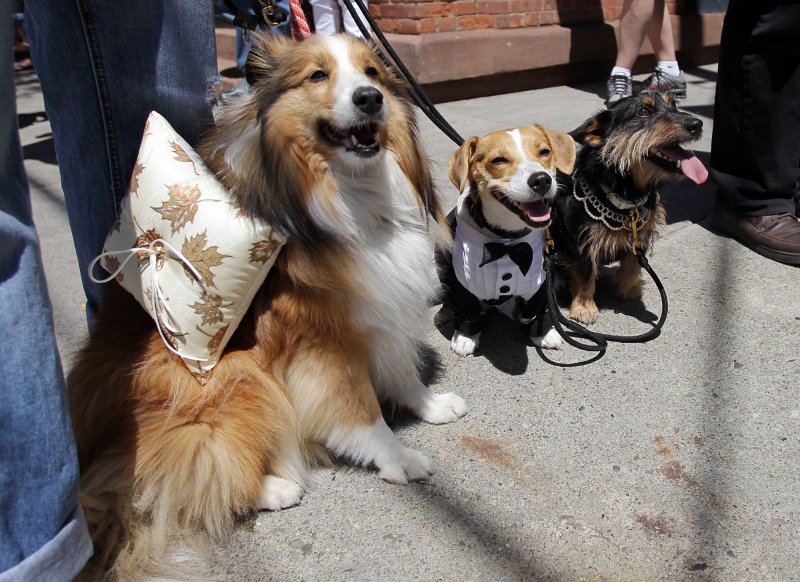Dogs are dressed in costumes suited for the occasion hours before the wedding of Chelsea Clinton and Marc Mezvinsky in Rhinebeck New York City on July 31, 2010. UPI/John Angelillo |
License Photo
CHICAGO, Oct. 10 (UPI) -- There's an old joke about pet owners looking like their pets; it sometimes appears amusingly true, but what about matching personalities?
A study published in the July Proceedings of the Royal Society B in Great Britain indicates while all dogs may not physically resemble their owners, they do imitate their human companions.
It seems to be psychologically similar to "group think" -- humans spontaneously following a leader.
In the case of dogs, it shows up when a dog imitates movements or behaviors -- even when the animals have no reason to do so.
"This suggests that, like humans, dogs are subject to 'automatic imitation'; they cannot inhibit ... the tendency to imitate head use and/or paw use," wrote University of Vienna researcher Friederike Range, the study's lead author. "This finding suggests that the dogs brought with them to the experiment a tendency automatically to imitate hand use and/or paw use by their owner; to imitate these actions even when it was costly to do so."
Range, an expert in cognitive biology, and her team observed 10 adult dogs of various breeds and their owners to reach their conclusions.
While there may be "dog people" predisposed to canines and "cat people" who prefer the company of felines, can a potential pet owners match personality traits of a pet to their own characteristics?
If dogs, natural pack animals that share a special bond with humans after thousands of years, can mirror human behavior what about personalities? For many dog lovers the question is a no-brainer.
Every dog and cat owner has a cute story about a surprising or funny thing their pets have done, from opening a cabinet door where pet food is kept to calling 9-1-1 (programmed on speed dial) for help in an emergency.
"Dogs are special animals, both in terms of their evolutionary history of domestication and the range and intensity of their developmental training by humans," the study said. "Both of these factors may enhance the extent to which dogs attend to human activity."
There are some 168 breeds of dog and 41 breeds of cat recognized by the American Kennel Club and the Cat Fanciers' Association, which co-sponsor "Meet the Breeds" events to introduce people to various breeds.
Breeds have been selected to exhibit certain characteristics, one of the primary traits being temperament.
The Internet abounds with online quizzes offering to "find the best dog for your personality and lifestyle" -- a sort of canine social networking.
The AKC divides dogs into seven groups:
-- Sporting: retrievers, spaniels, setters, pointers and more;
-- Hound: Bloodhound, Bassett Hound, Dachshund, Beagle and more;
-- Working: Saint Bernards, boxers, Doberman pinschers and more;
-- Terrier: Scottish, Parson Jack Russell, Airedale, Wire Fox and more;
-- Toy: Pomeranians, pugs, Chihuahuas and more;
-- Non-Sporting: poodles, chow chows, bulldogs, Dalmatians and more, and
-- Herding: German shepherds, Old English sheepdogs and more.
Poodles, sheepdogs and shepherds are considered among the most intelligent breeds while Labrador Retrievers, Golden Retrievers and Bearded Collies are generally regarded as most friendly.
Pugs, terriers and Corgis are good city dogs while the Basenji (known as the "barkless" dog), the Whippet, the Swiss Mountain Dog and the Borzoi may be quieter.
It all depends on the individual dog and its owner.
Friendliness may be more nurture than nature. A well-socialized animal usually is not the one sitting nervously in the back of a cage or kennel.
"The dog that doesn't approach anyone is a dog that's got some social issues," Dawn Rehus, a Chicago-area dog obedience trainer, told the Braintree Forum.
Indiana University researchers found urban dwellers tended to regard pets as companions and family members while people with rural backgrounds tended to see them as animals.
"Which makes sense given the utilitarian relationships people in rural areas are more likely to have with a range of different animals -- from farm to wild animals," said David Blouin of IU South Bend in a statement.
"People who think of their pets as their children often re-evaluate this thought when they have human children of their own," he said.
Our terriers are definitely family members. When we drove to Amish country to pick up a Welsh terrier, we couldn't help but notice how the puppies were treated on the farm.
They were well cared for but not allowed inside the family's home. Our vet was impressed their vaccinations were precise and up to date with lot numbers of the vaccines and the dates they were administered kept on index cards with stickers -- just like livestock.
Nearly any dog can be a house dog.
The AKC divides dogs into six general personality types: aggressive, confident, outgoing, adaptable, insecure and independent, and like humans those traits vary from animal to animal.
While some breeds like dachshunds, Manchester terriers and Chihuahuas and Pekingese don't require as much exercise as an energetic border collie, it's not a given that a small dog will be easier to handle than a sedentary 180-pound Mastiff.
In some cases, an older dog already socialized and house-trained may be a better pet for an apartment dweller than a yapping pup.
Finally, the old saw about "fighting like cats and dogs" may be a fallacy.
The AKC and CFA say if you want to bring a dog into a home with cats choose a breed used to hunt game and vermin like a cat, or a non-sporting breed, like a bulldog, that's a good companion animal. Some toy breeds have even been trained to use a litter box. While large breeds like sight hounds, bred to chase rabbits, may not be as good with cats, the groups say most dogs can get along well with felines if they are introduced into a household as puppies.















